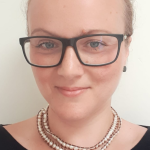Dr. Chiara Falangola, Lecturer of Italian at UBC, shares how she landed tenure-track positions in both French and Italian Studies throughout her career, after completing a PhD in French Studies at UBC’s Department of French, Hispanic and Italian Studies.


“Even if I was specializing in French literature and had no conscious intention of teaching Italian language at the time, the Italian faculty members really helped me see how valuable it was to experience teaching and researching in Italian. And they were right: I was hired in a tenure-track French and Italian position in the States within a year of finishing my PhD.”
Graduate Student Experience
I chose to pursue my PhD in French Studies at UBC because I’d had a case of topophilia for Vancouver for a very long time. My then advisor at La Sapienza in Rome told me there was a vingtiémiste colleague of his that worked at the Department of French, Hispanic and Italian Studies (FHIS), whose work I would have loved. That certain colleague ended up being the best advisor and research mentor I could have asked for.
FHIS allowed me to be ready for both teaching and research opportunities. On the one hand, I had an incredible supervisor whose courses really tapped into my natural predisposition for disaster literature and love for research. I also enrolled in a series of different seminars taught by terrific specialists in cinema, the Renaissance, and québécois literature.
On the other hand, the department really supported the professional development of TAs, as we were responsible for teaching and assessing full courses. So, apart from the valuable field experience, I also took several pedagogy-oriented workshops organized by the department and UBC’s Centre for Teaching, Learning, and Technology.
Career
One of the most important things that FHIS did for me was allow me to teach Italian along with French. Even if I was specializing in French literature and had no conscious intention of teaching Italian language at the time, the Italian faculty members really helped me see how valuable it was to experience teaching Italian and working as a research assistant on second-language acquisition projects.
And they were right: I was hired in a tenure-track French and Italian position in the States within a year of finishing my PhD. In my previous institution, I was hired to revive the French and Francophone majors and minors, and to develop and promote the newly created Italian minor.
With regards to my creation and revision of course content, lower-level language courses undertook the integration of authentic, diversified and audience-adequate culture content; intermediate and advanced courses were built around literature and culture, allowing students to keep advancing their language skills, while building the foundation for visual literacy and literary analysis needed for upper-level courses; and upper-level literature and cinema courses offered students the ability to: a) build a generalist knowledge of literary and cultural movements across the centuries, b) to able to reflect in more synchronous terms about themes, social and cultural issues, and genres, and c) be exposed to authors and directors out of the traditional canon.
Advice
“The best dissertation is a done dissertation.”
Off the top of my head, I would give graduate students four pieces of advice:
- Take as many diversified seminars as possible (even beyond the number of credits required, simply as auditors)—not only for your personal growth, but also for the sake of the students that you will teach in the future.
- The evergreen: “The best dissertation is a done dissertation.”
- Once that dissertation is done, don’t keep it in the drawer because you think it needs endless edits before being sent out to publishers.
- Go to as many conferences as possible—it is great practice for so many academic skills, and it is fun!
The doctoral studies years are some of the most memorable of my life and I have all these good memories in the FHIS Department—so I feel a lot of gratitude for how I was able to grow intellectually and professionally in it. I feel a connection to the department, to the people in FHIS from whom, in one way or the other, I learned from.
I am very excited to contribute to the continued growth of the Italian program at UBC; there is so much potential, so much dedication from every single faculty member, and different strengths and expertise to nurture a program that is successful, authentic and dynamic.


